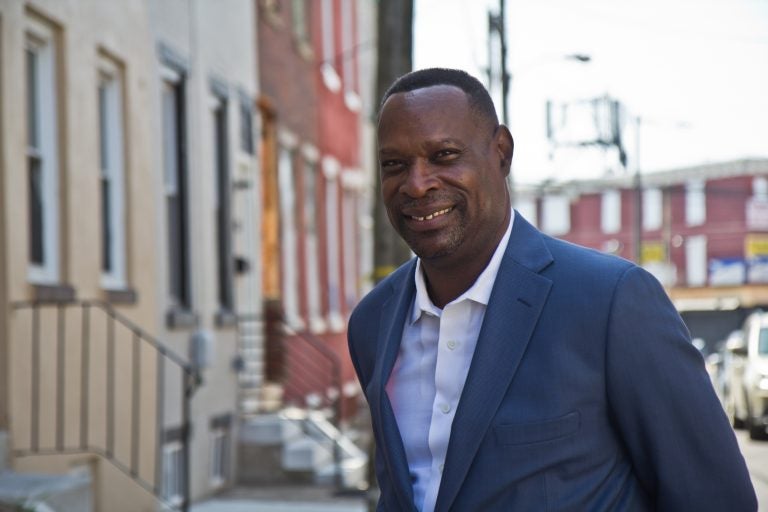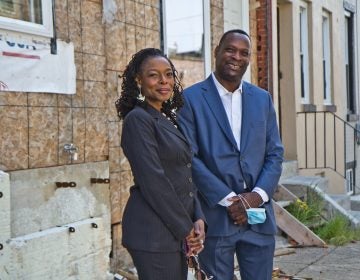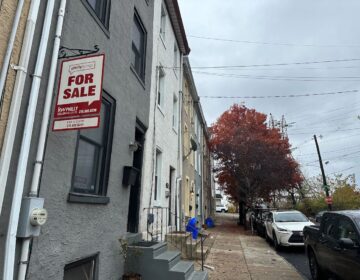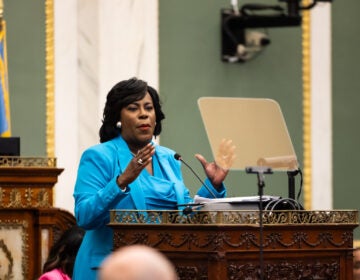Philly to launch loan fund for Black and brown affordable housing developers
Seeded with roughly $11 million in city funds, the Philadelphia Accelerator Fund aims to finance Black and brown developers to build affordable housing.

Real estate developer Anthony Fullard. (Kimberly Paynter/WHYY)
Philadelphia is preparing to launch a new city-backed loan fund designed to increase access to capital for Black and brown developers building affordable housing in Philly.
Seeded with roughly $11 million in city funds, the Philadelphia Accelerator Fund is a public-private partnership designed to provide flexible funds to Black and brown developers facing systemic barriers to traditional bank financing.
Modeled after San Francisco’s Housing Accelerator Fund, which offers loans to nonprofit affordable housing developers so they can compete with market-rate builders to buy buildings and land, the idea came out of discussions that happened during the creation of the city’s 2018 Housing for Equity action plan, said Greg Heller, vice president of community investments at Philadelphia Housing Development Corporation and the director of the fund.
“What we heard over and over again was that developers who are trying to build affordable housing and invest in neighborhoods were having a hard time getting capital from banks and traditional sources,” Heller said.
Heller and his colleagues are now working to raise another $30 million dollars by the fall. Once they hit that goal, the fund can begin offering loans and investment opportunities. In five years, the Fund wants to raise more than $100 million, produce 6,000 affordable housing units, and leverage more than $1 billion in total developmental costs.
City officials are agnostic about the kind of housing the fund will support — as long as some project units target below-market-rate customers and need non-traditional financing. Developers planning for-sale homes, multifamily rentals and subsidized housing are all welcome to apply. Eligible projects can serve people who earn up to 120% of area median income, which is around $73,000 for an individual.
Heller acknowledged that the limit is high for what is considered “affordable.”
“We didn’t want to totally limit it, because in some neighborhoods, building workforce housing is also what’s needed,” Heller said, noting that projects designed with more restrictive area median incomes and serving communities at risk of displacement will be prioritized.
Anthony Fullard, president of West Powelton Development Corporation, is one potential borrower who plans to apply when the fund launches. He hopes it can help him do more ambitious projects and encourage other Black developers to do the same. The fund will provide advisory services to help companies apply for the loan and offer advisors to help them navigate the process.
Fullard’s focus is on residential homes, usually single-family and his focus has always been on Black families. An Accelerator loan would help him build mixed-income housing projects, he said.
“Developers like me spend a lot of time in the secondary market because I can’t get approved with conventional banking,” he said. “Normally, those banks lend money to development companies that already have the money.”
Fullard said his experience with secondary markets meant higher interest rates and higher costs if a project needs an extension.
Mo Rushdy, chairman of the board for the Fund and the managing partner at the real estate development firm The Riverwards Group, said he sees this as a way to make building affordable housing more viable for developers who work in the private sector.
He also sees this as an opportunity since Philadelphia passed a land disposition policy which allows for non-competitive sales for development with at least 51% affordable housing. Historically, affordable housing has been a difficult sell for private developers because with the high cost of construction, there isn’t much of a profit.
“The city, through that legislation, has added another layer of assistance to basically push the private sector into the business of building affordable homes,” Rushdy said. “Now, if we don’t have the accelerator fund, who’s going to take advantage of this legislation? It’s going to be developers like myself and the [other] usual suspects that do affordable housing in the city.”
Rushdy sees the Fund as a way to even the playing field so developers who are already in the neighborhood can also take advantage of the opportunity.
“The message is just that subsidized affordable housing is important but it’s insufficient to deal with the need that we have, and we need to focus more energy, time, money, resources on the naturally occurring affordable housing,” Heller said.
The fund will score applicants on traditional values like credit worthiness as well as social impact, taking into account how much the surrounding community stands to benefit from a given project.
 WHYY is one of over 20 news organizations producing Broke in Philly, a collaborative reporting project on solutions to poverty and the city’s push towards economic justice. Follow us at @BrokeInPhilly.
WHYY is one of over 20 news organizations producing Broke in Philly, a collaborative reporting project on solutions to poverty and the city’s push towards economic justice. Follow us at @BrokeInPhilly.

Subscribe to PlanPhilly
WHYY is your source for fact-based, in-depth journalism and information. As a nonprofit organization, we rely on financial support from readers like you. Please give today.









